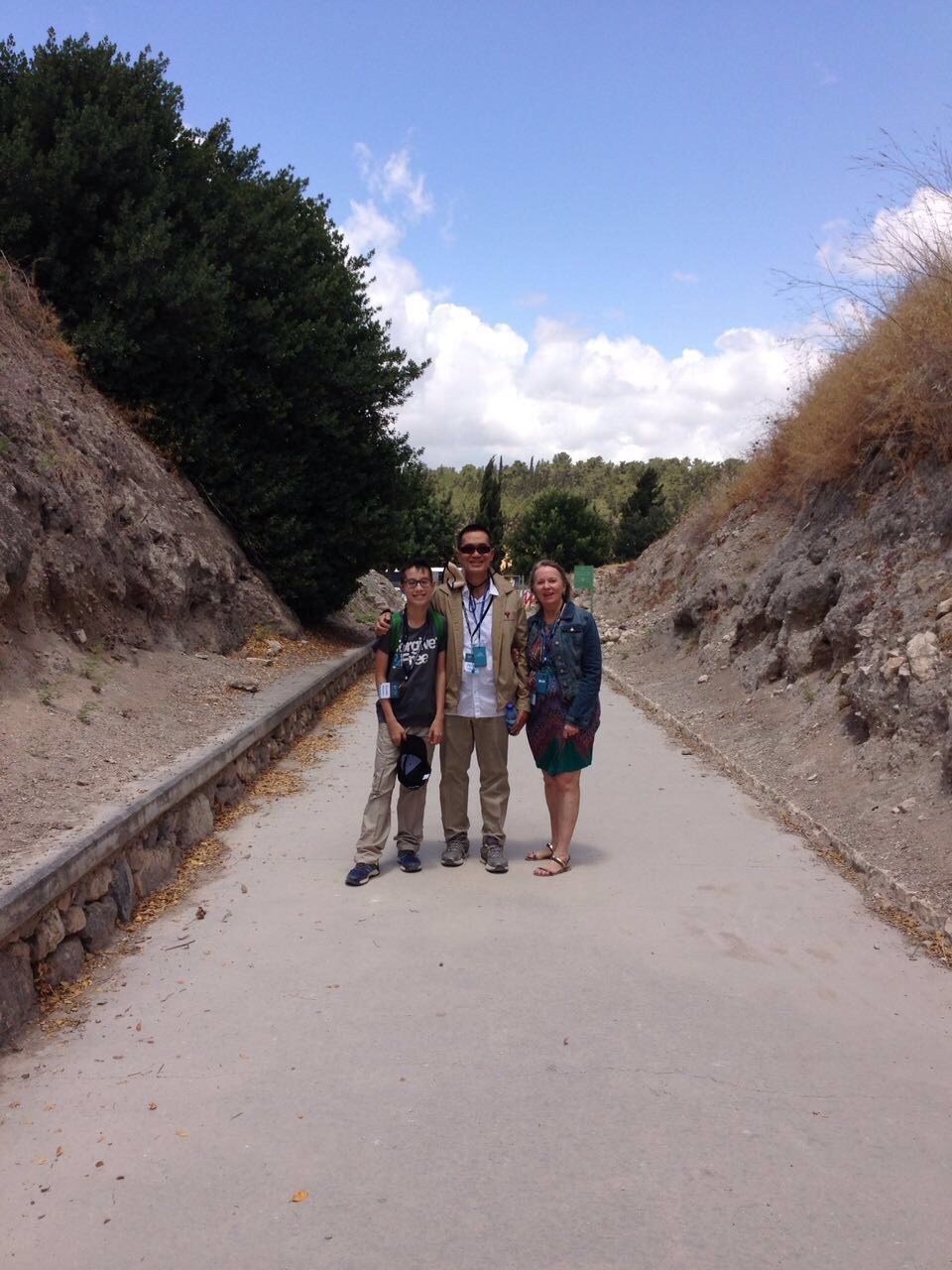When Elijah arrived from his Holy Land Tour last Tuesday it was 12:30 AM so his younger siblings had to wait till the morning to see him. They had been counting the days!
 (Elijah took this trip with my parents who took him for his 13th birthday)
(Elijah took this trip with my parents who took him for his 13th birthday)
Elijah was pretty exhausted so he slept in longer than my other kids did that morning. The cute thing is that Edan sat at the foot of Elijah’s bed, patiently waiting for him to wake up. He just watched Elijah, anticipating the moment when his eyes would open.
As soon as he did, all of my kids pounced on Elijah, hugging him repeatedly. They all started chatting in a lively manner, trying to get his attention, trying to tell him stories about things they did while he was away. At the breakfast table, they spent two hours laughing and engaging one another in conversation. It was obvious that they missed their older brother a lot. Even our two-year old, Catalina said so.
Homeschooling has played a big part in cultivating our children’s deep love and affection for one another. Edric and I almost always get the socialization question when we do Q and A portions in our seminars on homeschooling. Because I am a homeschooling mom, I don’t quite understand why people think that socialization is an issue for homeschoolers. Sure, they may not get to hang out with same-aged peers every single day, but they don’t lack opportunities to have great relationships with other children, especially their siblings.
Most of us have been conditioned to believe that the school setting is where children ought to make friends. Eyebrows of concern are raised when a parent removes a child from this environment and keeps them at home to learn. What friends will they possibly have is a question that a lot of parents worry about as they weigh the pros and cons of home education.
However, let’s be comfortingly realistic. In the Philippines it’s hard to imagine that a homeschooled child can grow up isolated, lonely, and socially awkward just because they don’t go to a school and have classmates. First of all, even without counting siblings, the number of cousins most Filipino kids have is astounding! Furthermore, Filipinos naturally congregate and get together. For example, there isn’t a week that goes by without the celebration of someone’s birthday.
Plus, homeschoolers also meet with other homeschooling families and form coops or playgroups that meet regularly. Most homeschool families I know have to tone down their social activities in order to get their academics done!
Therefore socialization really isn’t an issue at all. Sadly, I think the greater issue is that children are herded together in classrooms in a very unnatural way. After all, when a child leaves school and moves on to work or start a business or pursue a profession, they are almost never in a predicament that looks or feels like a classroom.
So, while children need relationships, let’s not make the mistake of thinking that they are better off developing these outside of the home. A study by The Family Pediatrics said that “when the family environment enables their (children’s) needs to be met, children generally turn out well, both socially and psychologically…The ability to cope with and adjust to life problems and demands is based upon psychological foundations of early family experiences.” (www.kon.org/urc/v5/mahalihali.html )
Personally, I believed that home provides the most natural context for children to grasp and enjoy the beauty of relationships…what it means to love, forgive, accept, and sacrifice for one another. Socialization has actually become a compelling reason for Edric and I to keep homeschooling. It gives our children the opportunity to practice relationships principles day in and day out.
 Tonight, Edric and I went out on a date and came home early. It was 7:45 PM and we spied on our children as we snuck up the stairs to avoid announcing that we had arrived. We saw them huddle together over a game in our homeschool room, enjoying one another’s company and totally unconscious of our presence. It was a sweet sight to hear their unscripted laughter.
Tonight, Edric and I went out on a date and came home early. It was 7:45 PM and we spied on our children as we snuck up the stairs to avoid announcing that we had arrived. We saw them huddle together over a game in our homeschool room, enjoying one another’s company and totally unconscious of our presence. It was a sweet sight to hear their unscripted laughter.
My kids may not have hundreds of friends. They have a good number of friends (most of them homeschooled, too), but for me what’s more important is that they have one another. Although they still squabble and work through their differences as brothers and sisters, they are embracing more and more the wonderful truth that siblings make the best of friends.
I enjoyed the same blessing growing up and today, I still call my siblings my best friends…




Thank you Joy for this encouraging and reassuring article, my husband and I are going to start homeschooling our two boys this year and this article really helps put things in perspective in terms of the kids’ socialization. Praise God for His work in your lives!